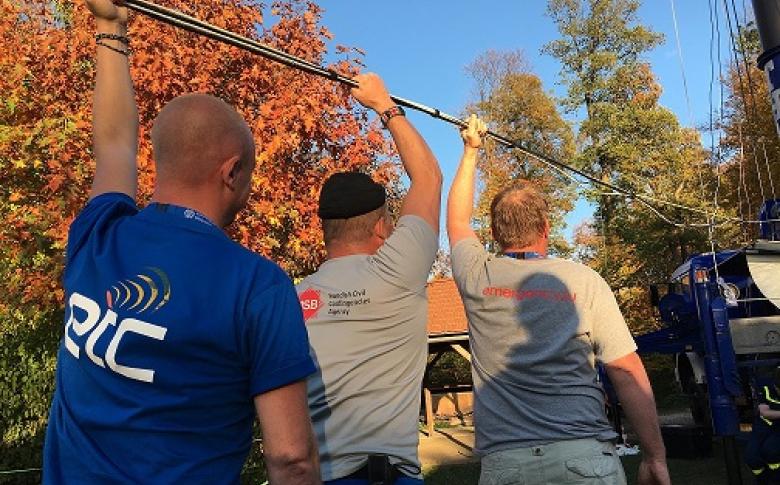OpEx Bravo: Why 2017 was Different.

The importance of preparedness is well-acknowledged in humanitarian and emergency responses. While we do our best to plan and prepare ahead, putting people through an emegency simulation like OpEx Bravo assesses how participants respond to different stressful situations where they constantly need to make decisions that ultimately impact how quickly the Emergency Telecommunications Cluster (ETC) can connect humanitarians in those first crucial moments.
From start to finish, OpEx Bravo is an intensive week-long exercise that puts participants in as near-field conditions as possible. For Tomas “Macgyver” Vigebjörk an experienced MSB Radio Technician with several missions under his belt, this year’s edition felt very real:
“I really loved it. It felt like a real mission. I’m so impressed! (…) Everything surprised me!

2017 was the first time the ETC merged their OpEx Bravo exercise with the Logistics Cluster’s Logistics Response Team (LRT) training. The joint exercise was held in October and hosted by the German Federal Agency for Technical Relief (THW) in Neuhausen Germany. While the actual details of the joint exercise are kept hush-hush, one key difference this year for ETC participants was having real users as part of the scenario. Logistics Cluster personnel relied on ETC common ICT services for their own training.
The joint exercise also provided ETC participants with user feedback, which in a real emergency is critical to assess and improve the quality of the services.
“I learned a lot (…) about team building, how to work with a lot of people coming from different sides and the challenges with working with the logistics [cluster], real users who don’t have a connection – you have to sort it out with your network, negotiate with NGOs in the cluster system. It was a big challenge for me!”
- Dieynaba Ben Messaoud, ICT Associate, UNHCR

OpEx Bravo was also a unique opportunity for a lot of people to find out how they coordinate with other organisations in field conditions. Knowing how to work alongside others and understanding the professional gaps between us is key to improving humanitarian collaboration. For a lot of participants, the faces they met during the intensive week-long exercise will likely be colleagues they collaborate with in future emergencies.
“The added Value for non-UN participants in OpEx bravo is networking and coordination, meeting colleagues that you will eventually need to get operational with very rapidly on the ground. If you know them already, you’re halfway there.”
- Elaine Burroughs, IT Programme Manager, Save the Children International

For some of the organisers, this year’s joint-exercise was especially informative to see how two of the most crucial pillars in emergency responses, the ETC and Logistics Cluster, coordinate amongst themselves when it matters.
“I think one of the actual good things that we’ve learned is where some of the gaps in our capability and development are, which for me is hugely important and that’s something we will take forward through the next series of trainings and the Opex merger next year.”
- Stephen Clark, Training Specialist, WFP FITTEST Training Services

The lessons learned during one sunny, autumn week on the German countryside have likely improved OpEx Bravo participants’ abilities to communicate, collaborate and coordinate more effectively during real emergencies.